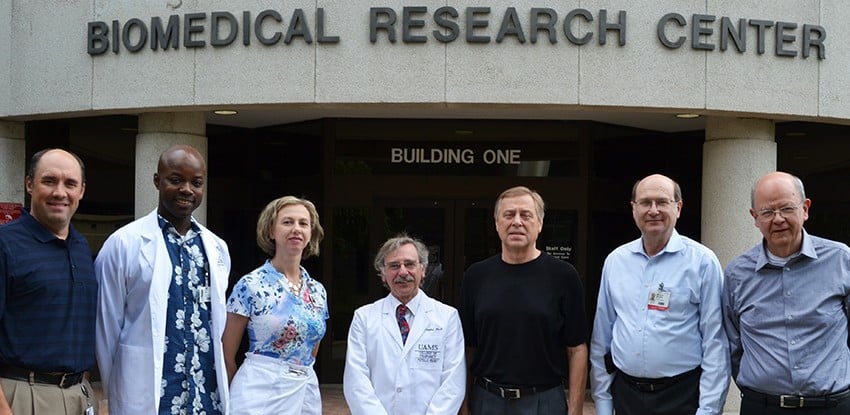UAMS Part of Arkansas Consortium Awarded $20 million by National Science Foundation
| Aug. 3, 2015 | The University of Arkansas for Medical Sciences (UAMS) is part of a consortium of Arkansas institutions that has been awarded a five-year, $20 million grant from the National Science Foundation (NSF) to support research and development of novel, functional surfaces produced using innovative materials and having nano-sized structures and features.
The funding is part of the National Science Foundation’s Experimental Program to Stimulate Competitive Research (EPSCoR), which promotes scientific progress nationwide by establishing partnerships with government, higher education and industry.
The other nine participants are the University of Arkansas at Fayetteville, University of Central Arkansas, University of Arkansas at Little Rock, Ouachita Baptist University, Southern Arkansas University, Philander Smith College, Arkansas State University, University of Arkansas at Pine Bluff, and the University of Arkansas at Monticello.
Obtaining this EPSCoR grant was the result of cooperative strategic planning and strong research collaborations involving all the participating Arkansas institutions and the grant will make collaborative research among all of these Arkansas institutions stronger and more productive.
The grant was made through the Arkansas Economic Development Commission’s (AEDC) Division of Science and Technology. The principal investigator for the EPSCoR grant is Gail McClure, Ph.D., of the AEDC. The co-principal investigator for the scientific program is Min Zou, Ph.D., of the University of Arkansas at Fayetteville.
More than $13.5 million of the $20 million grant will be used to directly support laboratory research. UAMS will receive $2.4 million to support its portion of the research effort, the second highest amount awarded out of the $13.5 million budgeted for research.
The remaining funds will be used for fellowships to support the undergraduate students, graduate students and postdoctoral fellows that will help perform the research and data analyses (12 at UAMS); student training; development of new courses related to surface science; developing and maintaining a statewide cyber infrastructure for data accumulation, management and sharing; and establishing and supporting the Arkansas-wide Center for Advanced Surface Engineering (CASE).
“CASE provides opportunities for UAMS-based investigators and students to work collaboratively with scientists and engineers from other Arkansas institutions to create nanoscale materials that can be used to improve human health,” said UAMS Chancellor Dan Rahn, M.D.
The students and fellows that are supported and trained by the EPSCoR grant will eventually provide the trained workforce required by the Arkansas businesses and manufacturing that develop from the EPSCoR grant research.
CASE will also support community outreach programs, including those to educate and encourage high school students to study the surface sciences related to the EPSCoR research and CASE.
Lawrence Cornett, UAMS vice chancellor for research, said the health benefits could be far reaching.
“I’m particularly excited about an initial project that will be carried out in the center,” Cornett said. “The project will develop an improved artificial extracellular matrix that will enable neurons to be more easily studied in the laboratory, providing a better system to eventually test new treatments for neurological disorders.”
In addition to neuroscience, CASE researchers in Arkansas will develop novel lubrication materials to improve machinery efficiencies and performance for advanced manufacturing. Other planned research outcomes include permeable food packing materials that can be fine-tuned for specific applications and selective filtration materials that can be used to mitigate product contamination.
The EPSCoR scientific investigators at UAMS are: Antiño R. Allen, Ph.D., (College of Pharmacy’s Division of Radiation Health); Michael J. Borrelli, Ph.D. (College of Medicine’s Department of Radiology), Peter A. Crooks, Ph.D., D.Sc. (College of Pharmacy’s Department of Pharmaceutical Sciences), Ekaterina Galanzha, Ph.D. (College of Medicine’s Department of Otolaryngology), Robert J. Griffin, Ph.D. (College of Medicine’s Department of Radiation Oncology), Dmitry Nedosekin, Ph.D. (College of Medicine’s Department of Otolaryngology) and Vladimir P. Zharov, Ph.D., D.Sc. (College of Medicine’s Department of Otolaryngology).
Borrelli and Zharov are co-leaders for two of the four, main EPSCoR projects — Cellular and Tunable Surfaces, and both serve on the steering committee that oversees the progress of all of the research projects and other aspects of this EPSCoR grant
